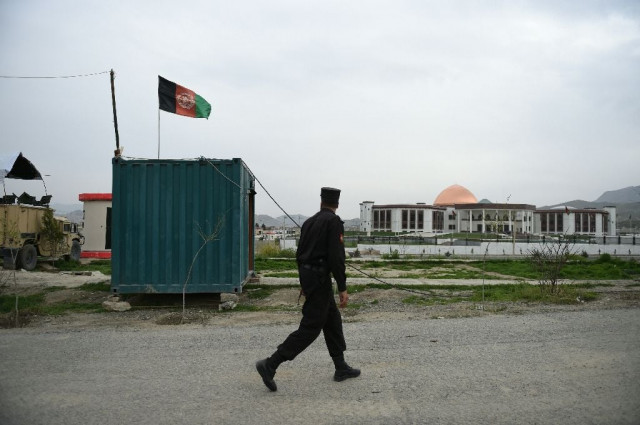Afghan leaders point fingers at Pakistan after Parliament attack
Blame game viewed as attempt to divert attention from govt’s own failures

An Afghan policeman walks in front of the newly built parliament complex in Kabul on March 28, 2016 after Taliban insurgents fired a barrage of rockets at the complex. PHOTO: AFP
Just minutes after Taliban fired four rockets on the newly-constructed Parliament building in Kabul this week, National Directorate of Security (NDS) Director Masoud Andarabi alleged the security agency in Pakistan is encouraging the Taliban to orchestrate attacks in Afghanistan. Andarabi made these remarks when he was summoned at the Wolesi Jirga (lower house of the Parliament) on March 28 to explain the spy agency’s failure to stop Taliban attacks.
Afghan Senate Chair Fazal Hadi Muslimyar criticised Pakistan’s approach. He said Pakistan “can no longer be trusted with regard to peace” and wants a “puppet government in Afghanistan”.
According to Muslimyar, there will be no hope for peace if Pakistan is involved in peace talks.
Convenient adversary
More often than not, some elements in Afghanistan tend to shift the blame on Pakistan and divert attention from their own failures. Conventional wisdom would have us believe that people like Muslimyar are not interested in peace and reconciliation in the war-torn country as they fear they will lose unprecedented privileges.
The remarks made by the NDS chief in the Parliament coincided with a statement by Afghan Deputy Foreign Minister Hekmat Khalil Karzai. He said Pakistan has not honoured its promises to bring the Taliban to the negotiation table.
“The quadrilateral meetings had decided Pakistan would facilitate direct talks between the Taliban and the Afghan government in the first week of March,” the Afghan media quoted Karzai as saying earlier this week. Karzai’s frustrations appear to be genuine as the Taliban leadership has discredited efforts made by the quadrilateral groups.
But the question that now arises is who is to be blamed for the Taliban’s decision to reject these talks. The answer to this question can be found through a series of statements and commentaries made on Taliban websites.
The Taliban’s decision to join peace talks will only depend on Afghanistan and the US. If they adopt a flexible approach towards certain confidence-building measures (CBM), the Taliban will be willing to give in. As a result, blaming Pakistan for the Taliban’s unwillingness to engage in peace talks would be unjustifiable.
However, we must not forget Afghanistan’s reservations would appear justifiable if Pakistan does not act on its promises.
Nevertheless, there are a few voices of reason in Afghanistan who do not want to stoke tension between both countries.
Afghanistan’s Ambassador in Pakistan Dr Omar Zakhilwal has been advising leaders to avoid hostile statements against his host country as it could negatively impact bilateral cooperation. However, his advice has fallen on deaf ears and this could potentially derail his mission to reduce tensions between both neighbours.
Opposite directions
So far, Pakistan’s response to these allegations has remained dignified and mature. During his weekly briefing on Thursday, Foreign Office Spokesperson Nafees Zakaria said no one should doubt Pakistan’s sincerity as the focus remains on organising peace talks for the larger interest of Afghanistan.
However, lawmakers, civil society members and the media in Afghanistan have decided to follow in the footsteps of the government. Members of an unofficial dialogue on Pak-Afghan security refused to travel to Islamabad for the final round of the talks.
Losing confidence
At this stage, Afghanistan’s National Unity Government is facing multiple challenges and the public appears to have lost faith in its rulers.
A survey conducted by Gallup and Voice of America’s Broadcasting Board of Governor states, “81% respondents said they were somewhat or very dissatisfied with the performance of the national unity government.” Meanwhile, 17% said they were “somewhat or very satisfied”.
Independent Election Commission of Afghanistan head Dr Yusuf Nuristani also resigned this week following controversies surrounding the long-awaited electoral reforms. The government must pay attention to these matters rather than blaming others for their own problems.
Published in The Express Tribune, April 2nd, 2016.













COMMENTS
Comments are moderated and generally will be posted if they are on-topic and not abusive.
For more information, please see our Comments FAQ